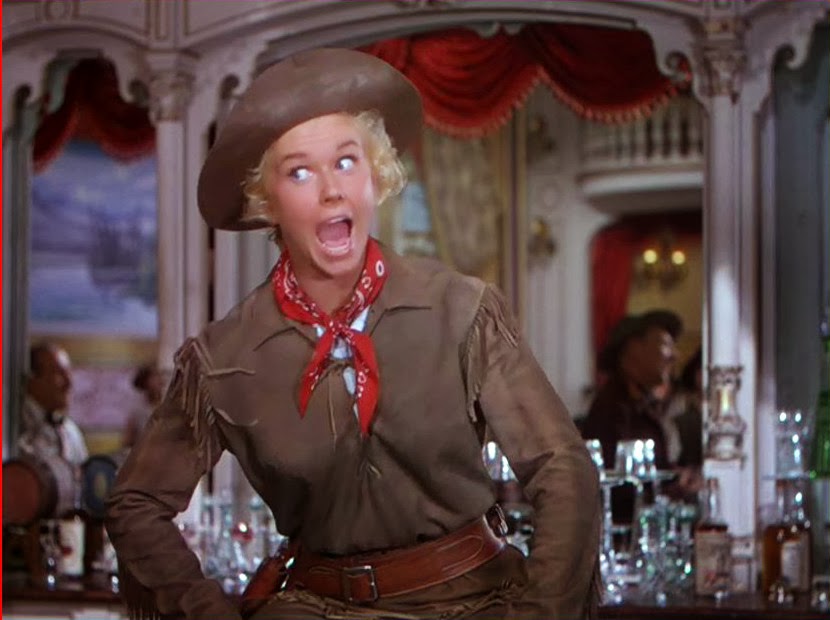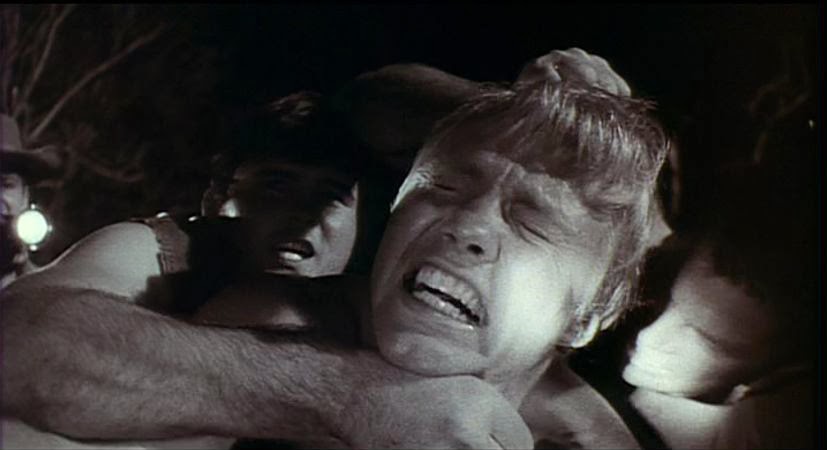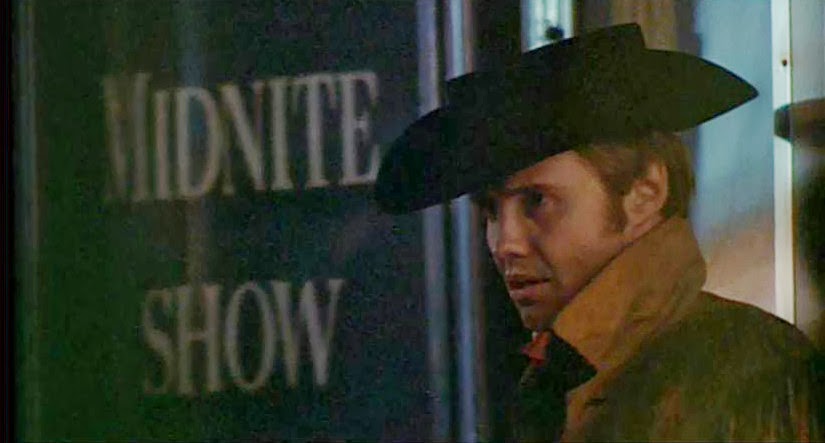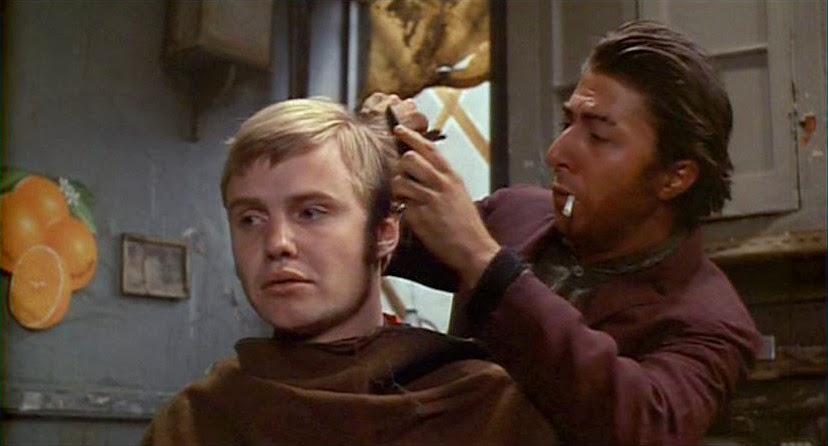A look at Doris Day’s filmography doesn't exactly yield (at least on the surface) a kaleidoscopic portrait of versatility when it comes to the kind of roles the extremely underrated actress has undertaken throughout her career. From her debut in 1948’s Romance on the High Seas, the studios made it their business to place Day in movies in which audiences were encouraged to partner the sunshiny implications of her alliterative stage name with the homespun effervescence suggested by her strapping good health; freckled, apple cheeks; and pleasantly toothsome smile. This, coupled with Day’s well-scrubbed sex-appeal and soothing, honey-coated voice—–which in spite of its clear-as-a-bell virtuosity, rarely strayed convincingly into the sultry or sensual—helped her to become one of the reigning boxoffice stars of the day (pun not only intended, but shoehorned). It also saddled her with an image of such strenuous and unrelenting wholesomeness, that for years term “Doris Day movie” was a pop-culture punchline signifying a certain brand of clean-cut cinema artificiality.
Famously, director Roman Polanski used the term “Like a Doris Day movie” to describe the disconcertingly sunny look he wanted for the early scenes of Rosemary’s Baby; and only recently I've come to learn of the existence of the slang phrase, “Doris Day parking,” which apparently is the name given to a miraculously open parking space found exactly in front of the point of one’s destination. (An allusion to a familiar movie trope, by no means restricted to Doris Day films, in which characters always seem to find available, convenient parking near, or right in front of, the place they need to be…even in crowded cities.)
The rather tragic particulars of Doris Day’s real life, pooled with her personal values and a loyalty to her sometimes rabidly image-sensitive fanbase, has led Day, throughout her career, to shun some of the darker, more against-type material offered her (Mike Nichol’s The Graduate, for example) that might have better showcased her range. For example, her fans reacted strongly to Doris smoking and drinking in Love Me or Leave Me, and as late as 1968, when the actress was well into her 40s, some fans bristled when, in her last film, With Six You Get Eggroll, her character—a widow with three children, not the constant virgin she usually played—goes to bed with suitor Brian Keith before they marry.
But Doris Day never set out to be a character actress. She was a star. And if the limitations of her squeaky-clean image and light-as-a-feather roles conspired to create in the public’s mind the impression that she was more a personality than an actress (especially during the “kitchen sink realism” era of the late '50s when her style of films began to fall out of favor), it’s nice to know that the passing of time has ultimately brought about a much-deserved reevaluation of her body of work. A reevaluation which rightfully places Doris Day amongst the most talented of Hollywood’s Golden Age stars.
The rather tragic particulars of Doris Day’s real life, pooled with her personal values and a loyalty to her sometimes rabidly image-sensitive fanbase, has led Day, throughout her career, to shun some of the darker, more against-type material offered her (Mike Nichol’s The Graduate, for example) that might have better showcased her range. For example, her fans reacted strongly to Doris smoking and drinking in Love Me or Leave Me, and as late as 1968, when the actress was well into her 40s, some fans bristled when, in her last film, With Six You Get Eggroll, her character—a widow with three children, not the constant virgin she usually played—goes to bed with suitor Brian Keith before they marry.
But Doris Day never set out to be a character actress. She was a star. And if the limitations of her squeaky-clean image and light-as-a-feather roles conspired to create in the public’s mind the impression that she was more a personality than an actress (especially during the “kitchen sink realism” era of the late '50s when her style of films began to fall out of favor), it’s nice to know that the passing of time has ultimately brought about a much-deserved reevaluation of her body of work. A reevaluation which rightfully places Doris Day amongst the most talented of Hollywood’s Golden Age stars.
 |
| Doris Day as Calamity Jane (nee Martha Jane Canary) |
 |
| Howard Keel as Wild Bill Hickok (James Butler Hickok) |
 |
| Allyn McLerie as Katie Brown |
 |
| Philip Carey as Lt. Daniel Gilmartin |
 |
| Dick Wesson as Francis Fryer |
 |
| Deja Vu All Over Again Howard Keel's face-off with Doris Day in the number, "I Can Do Without You," is a dead-ringer for Annie get Your Gun's "Anything You Can Do" |
Made at a time when original movie musicals were fast being replaced by adaptations of Broadway shows, Calamity Jane is, at 101 minutes, a brisk and snappy far cry from the butt-busting roadshow behemoths that musicals would become in later years, and is an example of the Hollywood musical at its entertaining and unpretentious, best. (Historical and artistic merit notwithstanding, I've never been too enthusiastic about the arty self-seriousness that overtook the movie musical in the post-Agnes de Mille/An American in Paris years).
As befitting the time, the genre, and the film’s featherlight approach, Doris Day gives a performance that is oversized, but never overdone. Liberated from having to be all sweetness and light, Day is allowed to give full vent to the tomboyish, outdoorsy quality (read: butch) that has always lurked beneath even her most glamorous screen appearances. Calamity Jane gives us a Doris Day at her most rambunctiously appealing, and, in being given lively support by a score of catchy songs by the Oscar-winning team of Sammy Fain and Paul Francis Webster (Love is a Many Splendored Thing), Calamity Jane ranks among a short roster of films I think provide near-ideal showcases for a particular star’s talents and strengths. A list which includes: Meet Me in St Louis for Judy Garland, Singin’ in the Rain for Gene Kelly, Funny Girl for Barbra Streisand, The Unsinkable Molly Brown for Debbie Reynolds, Mary Poppins for Julie Andrews, and Cabaret for Liza Minnelli.
 |
| Gale Robbins appears briefly as sagebrush songbird, Adelaid Adams |
I’m not sure when it happened, but of late it has become a subtly dismissive form of insult to label anything as fun or purely entertaining. Crowd-pleasing pop stars Madonna and Lady Gaga became crashing bores after they stopped making infectious dance music and took up the mantle of serious artiste; likewise, Jerry Lewis ceased being even remotely funny (and he wasn't all that funny to begin with) once he and the French came to a meeting of the minds regarding his genius status.
Pretentiousness and self-seriousness has killed a lot of what is lively about the lively arts, so when a film like Calamity Jane comes along, devoted as it is to providing its audience with a rollicking good time and plenty of toe-tapping music, it is by no means a minor statement to assert my fondness for this film chiefly because it succeeds in being such a cheerful and thoroughly captivating entertainment.
The list of what works in Calamity Jane extends to the music (joyous, not a clunker in the bunch), performances (sharp as a tack), and pacing (glides along at a clip). But Calamity Jane starts out way ahead of the game by merely avoiding a few Musical 101 pitfalls which trip up filmmakers to this day:
Hire actors who can sing and dance
Seems a no-brainer, but after the mid-'60s, Hollywood adhered to a perverse prerequisite of ONLY making musicals with individuals devoid of musical skill of any kind (see: Camelot, Man of LaMancha, Goodbye, Mr. Chips, Paint Your Wagon, Lost Horizon).
Give songs a melody
I’m not calling for nursery rhymes or jungles, but hummable tunes of the sort that made the songs from The Wizard of Oz and Mary Poppins ones children remembered and wanted to sing along with. Too many musicals today are hamstrung by atonal, over-sophisticated melodies songs designed to either earn the composer a spot on the Billboard charts ("Colors of the Wind" from Pocahontas), or land the composer an Oscar nomination. The latter often resulting in songs so lacking in distinction, they could be inserted into any number of films with no loss of relevance (pretty much everything written by Randy Newman).
Entertain
I don't mean keep it light or frothy; I simply mean keep in mind that things like pacing, good humor, and energy go a long way with audiences. When Vincente Minnelli excised each and every uptempo song from his film adaptation of On a Clear Day You Can See Forever, one had to wonder, was it his express purpose for audiences not to have a good time?
Pretentiousness and self-seriousness has killed a lot of what is lively about the lively arts, so when a film like Calamity Jane comes along, devoted as it is to providing its audience with a rollicking good time and plenty of toe-tapping music, it is by no means a minor statement to assert my fondness for this film chiefly because it succeeds in being such a cheerful and thoroughly captivating entertainment.
The list of what works in Calamity Jane extends to the music (joyous, not a clunker in the bunch), performances (sharp as a tack), and pacing (glides along at a clip). But Calamity Jane starts out way ahead of the game by merely avoiding a few Musical 101 pitfalls which trip up filmmakers to this day:
Hire actors who can sing and dance
Seems a no-brainer, but after the mid-'60s, Hollywood adhered to a perverse prerequisite of ONLY making musicals with individuals devoid of musical skill of any kind (see: Camelot, Man of LaMancha, Goodbye, Mr. Chips, Paint Your Wagon, Lost Horizon).
Give songs a melody
I’m not calling for nursery rhymes or jungles, but hummable tunes of the sort that made the songs from The Wizard of Oz and Mary Poppins ones children remembered and wanted to sing along with. Too many musicals today are hamstrung by atonal, over-sophisticated melodies songs designed to either earn the composer a spot on the Billboard charts ("Colors of the Wind" from Pocahontas), or land the composer an Oscar nomination. The latter often resulting in songs so lacking in distinction, they could be inserted into any number of films with no loss of relevance (pretty much everything written by Randy Newman).
Entertain
I don't mean keep it light or frothy; I simply mean keep in mind that things like pacing, good humor, and energy go a long way with audiences. When Vincente Minnelli excised each and every uptempo song from his film adaptation of On a Clear Day You Can See Forever, one had to wonder, was it his express purpose for audiences not to have a good time?
PERFORMANCES
The price of being a Doris Day fan is having to resign oneself to the fact that only occasionally do her films measure up to her talent. Calamity Jane is such an occasion. Always a fine singer and actress, what’s impressive about Day in Calamity Jane is the sheer athleticism of her performance. Leaping about in form-fitting buckskin (which makes her resemble William Katt in Butch & Sundance: The Early Days) she displays a boisterous physicality that perfectly matches her full-throated brand of singing. A particular jaw-dropper is when she's singing while sitting crossing-legged on the bar, then raises herself to he feet by pushing off of her ankles. Amazing!
My partner and I take particular pleasure in poking fun at Calamity Jane's over-emphatic, inconsistent western dialect; which consists of terms like "cigar-reets" and "sarsparilly," yet accommodates words like "malign." And don't get me started on her adjective/verb/noun formula for insults: "You mangy pack of dirt-scratchin' beetles!"
My partner and I take particular pleasure in poking fun at Calamity Jane's over-emphatic, inconsistent western dialect; which consists of terms like "cigar-reets" and "sarsparilly," yet accommodates words like "malign." And don't get me started on her adjective/verb/noun formula for insults: "You mangy pack of dirt-scratchin' beetles!"
Howard Keel (who always seems to be on the losing end of a battle in trying to navigate his lips over his gorgeous but sizable teeth [caps?]) makes for a very appealing co-star. As was the case with Annie Get Your Gun, he has the curious ability of making chauvinism look charming.
THE STUFF OF DREAMS
It’s easy to see how Calamity Jane gained a reputation as a paean to gender independence and a coded, gay-identity musical viewed through the prism of '50s repression. The amount of time the film invests in comedy centered on identity, drag, and gender role reversal is certainly intentional, as are the gender-normative romantic complications that don’t quite gel: tomboyish Calamity is in love with hyper-masculine Lt. Gilmartin, who has eyes for ultra-femme Katie Brown. Calamity’s best buddy, Bill Hickok, relentlessly teases Calamity about her lack of womanly virtues, and he too is smitten with the girlish Katie. But the overall (unintentional) impression it leaves is that it is a film about the oppressiveness of traditional gender roles, and that the day-to-day "drag" of feminine clothes and masculine clothes doesn't define how much a woman is a woman and a man is a man.
 |
| Hickok has to appear in public in female Native-American costume as a form of shaming |
Wannabe showgirl/full-time maid Katie Brown returns to Deadwood with Calamity, becoming her roommate once landing a job at the local saloon. And if the cohabitating pair are revealed to share a livelier and more palpable chemistry than what has thus far been exhibited by either of the women with their rather stolid male love interests; that fact has nothing to do with what the film is intentionally trying to convey, and everything to do with the natural, unforced butch/femme synergy Doris Day and Allyn McLerie.
 |
| Female duets are rare in musicals, and McLerie and Day shine in the marvelous, "A Woman's Touch" |
In the end, heterosexual love wins out and the gender roles realign, but I don’t think it takes a Queer Eye to see that the two lantern-jawed males make a more appropriate-looking pair, just as the duo of Katie and Calamity look made for each other.
 |
| Seriously, who wouldn't have wanted to see these two hook-up? |
Bonus Material
In 1963, Carol Burnett starred in a TV adaptation of Calamity Jane. See a clip HERE.
Philip Carey in a Granny Goose Potato Chips commercial HERE
In 1963 Doris Day teamed with Robert Goulet for a studio album of songs from Annie Get Your Gun. Listen to their duet "Anything You Can Do" HERE
Hear Gil Peterson sing an ersatz rock & roll rendition of "Secret Love" in The Cool Ones HERE











































.JPG)














